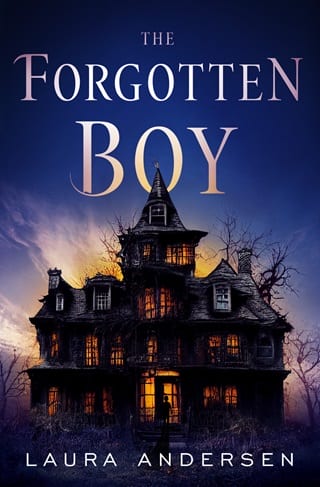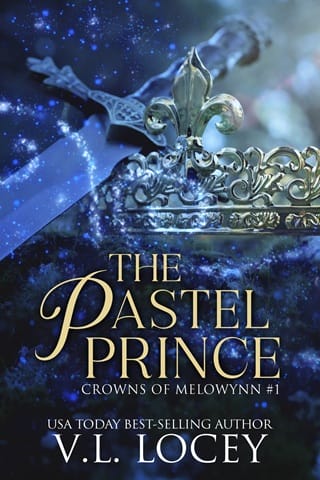Chapter Three
CHAPTER THREE
JULIET 2018
Juliet had always used to notice how poorly she slept her first night in a different place. But these days sleeping badly was her usual, so she was no more tired than normal when her alarm went off. She checked her texts and replied to the one her mother had sent at midnight Pennsylvania time when she'd been asleep: How's the haunted house?
She typed back, No ghosts yet, just a lot of dust and boxes.
When the job had been offered, Juliet's mother had spent an afternoon hour reminiscing about her great-aunt Clarissa. Juliet's English grandmother had moved to Philadelphia when she was ten, and family visits back had been mostly confined to London. But one August week when Juliet's mother was fourteen, she had spent a week with Clarissa at Havencross while her parents toured Switzerland.
"Brilliant," Juliet's mother had stated. "I mean really brilliant, like genius level. She had a master of arts from Cambridge and studied mathematics in Germany. She was in Paris when the French surrendered in 1940 and spent the rest of the war doing … something. She wouldn't talk about it. It was 1974 when I visited, and she'd only returned to Havencross the year before."
"And the house?" Juliet had asked, since that would be her job.
Her usually talkative mother had taken her time answering. "It didn't feel like a house that had been empty for years. Even with just Clarissa and me there, Havencross felt lived in. It had its own life, that house, or a memory of life. You felt that the house itself carried on no matter who might be there at any given time."
And though her mother had laughed off any ghostly sightings, she'd left Juliet with a lingering sense of … possibilities. If Juliet's life hadn't fallen off a cliff six months ago, she might have been interested in possibilities. Now she just wanted to work.
The best part of working all alone in an empty house was that she needn't think twice about wearing leggings and an old high school sweatshirt. She ate toast and yogurt standing up in the small kitchen and decided to begin where she was, in the rooms Clarissa Somersby last occupied.
The kitchen was as anonymous as a rental apartment, save for the blue-and-white willowware that would fetch a good price in an antique shop. Or maybe one of the far-flung family members would want some pieces. Making a note to ask Nell about it, Juliet took a quick look through all the cabinets and drawers, found nothing further of interest, and moved into the back bedroom.
More than twenty-five years after Clarissa's death, the room retained the scent of extreme old age, a mix of powder-fine skin and stale heat. The mattress was wrapped in a mix of linen and canvas to keep out small wildlife, but the bed frame was beautifully crafted of cherrywood with garlands of vines and flowers. There was a small fireplace with glazed Victorian tiles, and a mantel with two empty cut-glass vases on it.
Juliet opened a wardrobe—that had obviously been made by the same craftsman who made the bed—and made her first fascinating discovery: a wealth of vintage clothing.
Gorgeous wool in gray and ivory and houndstooth. Fine cashmere and velvet and floral cottons in the bias-cut, high-waisted, butterfly-sleeved fashion of the 1930s. In a hatbox that was itself worthy of collection, there were several confections that wouldn't look out of place at a contemporary royal wedding. Juliet decided Clarissa's bedroom was as good a place as any to begin collecting those pieces that should be evaluated separately for sale.
She spent the next hour putting things in boxes, wrapping the sturdier pieces in acid-free paper, and made a note on her phone to call Nell and ask for appropriate garment storage bags. When she had an array of boxes neatly lined against the wall, Juliet considered the dressing table.
It was not as expensive-looking or ornate as the bed and wardrobe, but charming with its delicately curved legs and scrolled edges. It reminded Juliet of the desk her parents had bought for her twelfth birthday. Something meant for a girl between childhood and adolescence. Had Clarissa clung onto this piece from her childhood until the very end?
The drawers contained only thick writing paper, embossed at the top with Clarissa's initials, and various beautiful fountain pens that Juliet set aside for sales consideration. And on the dressing table's surface sat three photographs in silver frames matching the one she'd found upstairs last night. The one in the middle, a family grouping of the same period as the boy's photograph, could have been entitled Successful Victorian Gentleman Surrounded by His Picture-perfect Family . Next to the mutton-chopped, middle-aged man sat a younger-looking woman with the upright carriage of one wearing a whalebone corset. There were four children: one fat baby in its mother's lap, a small girl of three or so with an enormous bow encircling her head, a much older girl, and a boy—the same bright-eyed, impish-faced boy of the upstairs photograph. Juliet felt a sharpness in her chest, barbed wire tightening around her beating heart, and turned the family photo face down on the dressing table.
The largest photograph was of Havencross itself, as seen from the long, sweeping driveway. She had a sudden image of Clarissa touching her fingers to the photo's glass, as perhaps she grew too old to walk comfortably outside and see that view for herself.
The third one was the most candid. As close to a snapshot as one could get in that time—Juliet considered the clothes and guessed World War I—of two women sitting on what she recognized as the front steps. They both wore light-colored blouses and dark skirts that just reached their ankles. One of the women had a bountiful, generous smile and looked as though she'd been caught midlaugh—indeed, she looked as though she were often caught midlaugh. In the black-and-white photo, her hair could only be said to be a lighter color than her companion's. Little drifts and tendrils of it floated around her cheeks and neck from however she'd secured the bulk of it.
The other woman's hair was more neatly pinned up, but even a hundred-year-old photo managed to hint at its glossy darkness. Something about the starkness of her cheekbones and chin reminded Juliet of her own reflection in the mirror—not a physical likeness, more an imprint of suffering. Her smile was smaller and shyer than her companion's, and an open book rested on her lap.
After a good deal of pointless staring—the photographs were hardly going to introduce themselves to her—Juliet moved on to the last room of the ground-floor suite. It was a smaller version of the study she'd found upstairs last night. She imagined Clarissa, forced by age and unsteady balance to move to the ground floor, choosing her most important books and papers to bring down with her. As such, she figured it would give her a good overview of Clarissa's mind at the end of her life.
The books confirmed her interest in English history, though in this low-ceilinged room the reference books and histories had narrowed to the fifteenth century. Juliet scanned the titles on the low bookshelf next to a burgundy leather recliner. Mostly nonfiction, fifteenth-century English history. The Wars of the Roses, then. Clarissa even had a well-read copy of Josephine Tey's The Daughter of Time , the popular novel dedicated to rehabilitating Richard III's character from its Tudor-era blackening.
There was also a shelf of local histories, including that of Havencross itself, some little more than photocopied pages bound together.
Juliet sat cross-legged on the floor before the bookshelves, wondering about the source of Clarissa's interest. The house, of course, she might reasonably be interested in the history of her family's home. But why the focus on the York–Lancaster conflict? Had Havencross been caught up in that long-ago war? Juliet's own academic specialty was Victorian and Edwardian social history; her knowledge of earlier centuries was sketchy.
Impulsively, she chose a random selection of histories to read at meals and in bed. If she was going to spend five months here alone, she needed something to think about besides cleaning and throwing stuff out. In that same mood, she picked up the photograph of the two women. Nell Somersby-Sims had said that the cleaner was part of a family that had lived here for generations. Maybe she could tell Juliet the story behind the unexpectedly moving portrait.
 Fullepub
Fullepub 



